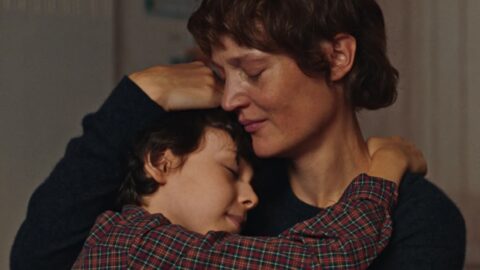Cis male heterosexual panic rears its ugly head in Love Me Tender (2025), Anna Cazenave Cambet’s devastating French custody drama starring Vicky Krieps. She plays Clémence, a mother and former lawyer turned aspiring novelist, who begins dating women three years after separating from her husband, Laurent (Antoine Reinartz) — prompting him to sue for custody of their son, Paul (Viggo Ferreira-Redier).
The film opens with a bold move: Clémence meets a woman at the local swimming pool, and the two hook up in a private changing room. It’s intimate, impulsive, and not exactly what you’d expect from a story centred on motherhood and family court. But that’s part of what makes it so interesting. This kind of behaviour might be labelled risky or even immoral by the court — or, frankly, by society at large. And sure enough, not long after Clémence comes out to Laurent, he flips. He cuts off access to their son, spreads lies about her and launches a full-blown custody battle.
At first, the absence of scenes depicting Laurent actively manipulating their son may seem like a narrative gap. We are not shown the subtle, insidious ways he might be turning Paul against Clémence. However, as the film progresses, it becomes clear that this omission is a deliberate and thoughtful choice. The narrative aligns closely with Clémence’s limited perspective, immersing the viewer in the same uncertainty and absence of information that defines her experience. She is shut out of Paul’s daily life, and like her, we are left to imagine what may be happening behind closed doors. It’s a disquieting and effective storytelling technique — one that underscores her growing isolation and the quiet, insidious ways in which institutional systems can work against queer parents.
While keeping the father offscreen is an effective choice, the film could benefit from a clearer sense of what’s driving his hostility. Is it classic homophobia? A sense of rejection and insecurity as a heterosexual man whose ex now prefers the company of women? Reactionary right-wing politics? Likely all three — and there’s certainly a hint of the latter. At one point, the books in Clémence’s home come under scrutiny, suggesting deeper ideological tensions. Or perhaps he’s simply a clever man who knows how to be both petty and ruthless when it serves his interests.
Eventually, Clémence is allowed to see her son — on a limited basis, under the watchful eyes of two social workers. These visits make up much of the film’s second act. How can a mother-son relationship thrive in such a controlled, unnatural environment? This arrangement stretches on for months, with Clémence caught between two worlds: fighting for her son while trying to maintain some semblance of a normal life for herself.
That’s a key element of this film — the recognition that all parents, queer or heterosexual, are entitled to lives of their own, including a bit of adult recreation. Cambet makes this clear through a parallel storyline in which Clémence allows herself to have some fun. Sometimes that means going out to a club or dancing with people the court — or the general public — might label as “unsavoury” (read: queer people doing drugs). But the film never becomes didactic in its portrayal of Clémence’s independence — going out, having sex, enjoying herself. Cambet trusts the audience to recognise the double standard: no one questions what the heterosexual father is doing on the weekends — whether he’s drinking or having the occasional casual hookup. Yet in this scenario, it’s only the queer parent who’s forced to justify that kind of behavior. The homophobia, the moral panic, the judgment — it’s all deeply embedded in the court system and society at large.
It would be easy to call this Kramer vs. Kramer (Robert Benton, 1979) with a gay twist, or to compare it to the more recent Our Son, (Bill Oliver, 2023), which focuses on a custody battle between same-sex parents. But this film’s true spiritual sister is the groundbreaking — and criminally underseen — A Question of Love, (Jerry Thorpe, 1978) a made-for-TV movie that was the first to depict gay parents on screen. Based on a true story and starring Gena Rowlands, it also centres on a mother in a lesbian relationship whose ex-husband takes her to court to gain custody of their children.
Love Me Tender and A Question of Love both confront the harsh realities many queer parents face: the enduring belief that queerness is incompatible with parenthood — that being anything other than heterosexual is a moral failing, meaning you’re incapable of providing a stable home for a child. Both films reveal how one man’s discomfort, magnified by a baseless accusation, can be enough to sever the bond between a mother and her children. In the end, it isn’t queerness that harms the child — it’s a court system that caters to lies, prejudice and heterosexual panic.
Krieps elevates any material she’s in — even the dreadful, nearly unwatchable Hot Milk (Rebecca Lenkiewicz, 2025), which premiered in the Berlinale competition back in February. While Love Me Tender occasionally drifts into less compelling subplots — such as one involving Clémence’s sick father — her riveting performance keeps the film consistently engaging. The persistent voiceover, drawn from Clémence’s writing, feels overly broad and instructional at times and could have been toned down. A late-stage romantic subplot with a journalist (Monia Chokri) further muddies the narrative, though it ultimately sets the stage for a powerful and sobering conclusion: at some point, you have to stop losing yourself in the exhausting pursuit of palatability for a heteronormative world that may never accept you.
Editor-at-large Jared loves movies and lives with Kiki in Berlin.





